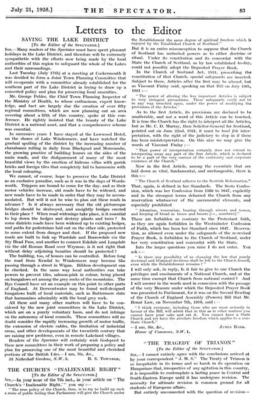THE CHURCH'S "INALIENABLE RIGHT"
[To the Editor of the SPECTATOR.]
Snt,—In your issue of the 7th inst., in your article on " The Church's " Inalienable Right,' " you say
" The true policy of the Church, then, is to try to build up such a state of public feeling that Parliament will give the Church under
the Establishment the same degree of spiritual freedom which Is enjoyed by the Established Church of Scotland."
But it is an entire misconception to suppose that the Church of Scotland has unlimited powers as to either doctrine or ritual. Under its constitution and its concordat with the State the Church of Scotland, as by law established to-day, could not possibly adopt the Deposited Prayer Book.
In the Church of Scotland Act, 1927, prescribing the constitution of that Church, special safeguards are inserted. Subject to these, Articles after the first may be altered, but as Viscount Finlay said, speaking on that Bill on July 10th, 1921 :— " The power of altering the less important Articles is subject to very stringent precautions. These safeguards could not be in any way trenched upon, under the power of modifying the provisions of the Articles."
As to the first Article, its provisions are declared to be unalterable, and not a word of this Article can be touched.
It is true the Church has the right to interpret all the Articles. but as Mr. C. D. Murray, then Solicitor-General for Scotland,
pointed out on June 22nd, 1921, it must be bond lide inter- pretation, with the right of the judiciary to step in if there has been misinterpretation. On this also we may give the
words of Viscount Finlay :-
"That power of interpretation certainly does not extend to interpreting away any part of the first Article, which is declared, to be a part of the very essence of the continuity and corporate existence of the Church."
Now in the first Article, among the essentials that are laid down as vital, fundamental, and unchangeable, there is this :—
" The Church of Scotland adheres to the Scottish Reformation." That, again, is defined in her Standards. The Scots Confes- sion, which was her Confession from 1560 to 1647, explicitly and in the strongest terms debarred the Church from any reservation whatsoever of the sacramental elements, and especially prohibited " Adoration, veneration, bearing through streets and towns, and keeping of bread in boxes and boosts [i.e., aumbries]."
These are forbidden as contrary to the Protestant faith, as they are again forbidden in the Westminster Confession of Faith, which has been her Standard since 1647. Reserva- tion, as allowed even under the safeguards of the re-revised Prayer Book, is forbidden to the Church of Scotland, under her very constitution and concordat with the State.
Into the larger questions you raise I do not enter. You ask :—
" Is there any possibility of so changing the law that purely doctrinal and liturgical decisions shall be left to the Church herself, even while the Establishment remains 7 " I will only ask, in reply, Is it fair to give to one Church the privileges and emoluments of a National Church, and at the same time exempt that Church from national control ? And
I will answer in the words used in connexion with the passage of the very Measure under which the Deposited Prayer Book was presented to Parliament, for it was on the Second Reading of the Church of England Assembly (Powers) Bill that Mr. Bonar Law, on November 7th, 1910, said :-
" I think everyone, including those who are most ardently in favour of the Bill, will admit that in this as in other matters you cannot have your cake and eat it. You cannot have a State Church and yet have the absolute freedom which applies to a non. State Church."
House of Commons, S.W.1.




















































 Previous page
Previous page